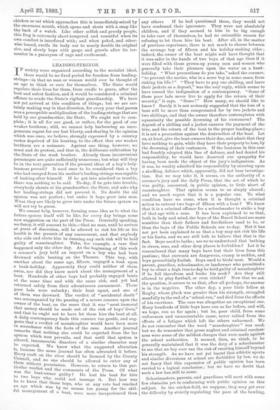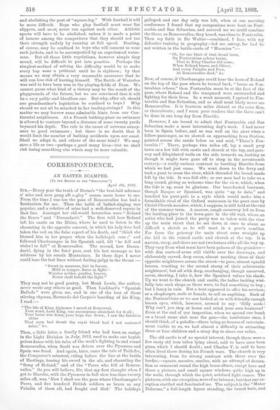LEADING-STRINGS.
IF society were organised according to the socialist ideal, there would be no fixed period for freedom from leading- strings—in that no man or woman would ever be thought of an age to think or care for themselves. The State would regulate their lives for them, from cradle to grave, after the best and safest fashion, and it would be considered a criminal 'offence to evade the State's vigilant guardianship. We have not yet arrived at this condition of things ; but we are cer- tainly making way in that direction, for every year that passes -sees a perceptible multiplication of the leading-strings that are held by our grandmother, the State. We ought not to corn- plain; it is all for our good, or rather, for the good of our weaker brethren; still, we cannot help harbouring an unre- generate regret for our lost liberty, and sharing in the opinion which was once, we believe, strongly expressed by a country rector deprived of his hunting, to the effect that our weaker brethren are a nuisance. Against one thing, however, we must and do protest, and that is, the deliberate cultivation by the State of the weak brother. Already those inconvenient personages are quite sufficiently numerous ; but what will they be in the next generation if the present ideas of a boy's help- lessness prevail? It used once to be considered that a boy who had escaped from his mother's leading-strings was capable of looking after himself. If he got into mischief or trouble, there was nothing to be said. To-day, if he gets into trouble, everybody shouts at his grandmother, the State, and asks why her leading-strings did not prevent it. No doubt the old system was not perfect ; but under it boys grew into men. What they are likely to grow into under the future system we will not try to guess.
We cannot help, however, forming some idea as to what the 'future system itself will be like, for every day brings some new suggestion on the part of the Press. Generally speaking, we fancy, it will amount to this,—that no man, until he arrives at years of discretion, will be allowed to risk his life or his health in the pursuit of any amusement, and that anybody who aids and abets him in running any such risk will be held guilty of manslaughter. Take, for example, a case that -happened only the other day. At the beginning of this week a coroner's jury held an inquest on a boy who had been drowned while boating on the Thames. This boy, with another about the same age, fifteen, engaged a boat upon a bank-holiday. Apparently they could neither of them 'Swim, nor did they know much about the management of a boat. Hundreds of other boys had probably engaged boats at the same time and with the same risk, and yet had returned safely from their adventurous amusement. These poor lads were unlucky; their boat upset, and one of of them was drowned. The verdict of "accidental death" was accompanied by the passing of a severe censure upon the 'awaer of the boat, on the score that it was "most immoral that money should be made out of the risk of boys' lives," and that he ought not to have let them hire the boat at all. A daily contemporary finds this censure too gentle, and sug- gests that a verdict of manslaughter would have been more in accordance with the facts of the case. Another journal remarks that nothing else could be expected from the lax system which now prevails, and that until that system is altered, innuraeaable disasters of a similar character may be expected. We know what the suggested alteration is, because the same journal has often advocated it before. :Every craft on the river should be licensed by the County Council, and no one ohould be allowed to enter any of them without permission. However, to return to this par- ticular verdict and the comments of the Press. Of what was the boat-owner guilty? He lent his boat for hire to two boys who could not manage it. But how was he to know that those boys, who at any rate had reached an age which was by no means too young for the skil- ful management of a boat, were more inexperienced than
any others If he had questioned them, they would not have confessed their ignorance. They were not absolutely children, and if they seemed to him to be big enough to take care of themselves, he had no ostensible reason for refusing to let them hire his boat. After all, in the matter of previous experience, there is not much to choose between the average boy of fifteen and his holiday.ms,king elder ; indeed, the owner of the boat might well have thought that it was safer in the hands of two boys of that age than if it were filled with those grown-up young men and women who generally take their pleasure upon the water on a bank- holiday. "What precautions do you take," asked the coroner, "to prevent the novice, who is a mere boy in some cases, from risking his life ?" "They have to pay one shilling, and leave their jackets as a deposit," was the naif reply, which seems to have roused the indignation of a contemporary. "Some of these poor lads never live to apply for the return of their
security," it says. Some !" How many, we should like to know ? Surely it is not seriously suggested that the loss of a boat will be more than compensated for by two jackets and two shillings, and that the owner therefore contemplates with equanimity the possible drowning of his customers ? The deposit of a shilling and a jacket ensures the payment of the hire, and the return of the boat to the proper landing-place ; it is not a precaution against the destruction of the boat. Let us, at least, give the boat-owners their due, and admit that they have nothing to gain, while they have their property to lose, by the drowning of their customers. If the boatman in this case had frankly adopted this line of defence, and had denied his responsibility, he would have deserved our sympathy for having been made the object of the jury's indignation. As it was, he weakly admitted his responsibility by entering upon a shuffling defence which, apparently, did not bear investiga- tion. But we may take it, it seems, on the authority of a coroner's jury and the daily Press, that the act of which he was guilty, amounted, in public opinion, to little short of manslaughter. That opinion seems to us simply absurd; and we much regret that it is a popular one. To what condition have we come, when it is thought a criminal action to entrust two boys of fifteen with a boat ? We know that it is a criminal offence for a schoolmaster to strike a boy of that age with a cane. It has been explained to us that, both in body and mind, the boys of the Board School are more sensitive than their fathers and forefathers used to be, or than the boys of the Public Schools are to-day. But it has not yet been explained to us that a boy may not risk his life or his limbs, and we are still loth to believe that that is the fact. Boys used to bathe ; are we to understand that bathing in rivers, seas, and other deep places is forbidden P Let it be remembered that many boys have lost their lives from this pastime; that currents are dangerous, cramp is sudden, and boys proverbially foolish. Boys used to birds'-nest. Would a parent, guardian, schoolmaster, or landowner who permitted a boy to climb a high tree to-day be held guilty of manslaughter if he fell therefrom and broke his neck P Are they still allowed to play football, or even cricket? Now that we ask the question, it occurs to us that, after all perhaps, the answer is in the negative. The other day, a poor little fellow at Rugby, whose pluck was greater than his strength, struggled manfully to the end of a" school-run," and died from the effects of his exertions. The case was altogether an exceptional one. Many hundreds of little boys have run as far before, and will, we hope, run as far again ; but he, poor child, from some unforeseen and unaccountable cause, never rallied from the effects of a fatigue which left the others unharmed. We do not remember that the word " manslaughter " was used, but we do remember that gross neglect and criminal careless- ness were some of the mildest charges that were made against the school authorities. It seemed, then, we think, to be generally maintained that it was the duty of a schoolmaster to see that no boy ever ran the risk of exerting himself beyond his strength. As we have not yet learnt that athletic sports and similar diversions at school are forbidden by law, we do not fancy that this expression of public opinion has been carried to a logical conclusion ; but we have no doubt that such a law has still to come.
Schoolmasters, parents, and guardians will meet with some few obstacles yet in conforming with public opinion on this subject. In the cricket-field, we suppose, they may get over the difficulty by strictly regulating the pace of the bowling, and abolishing the post of "square-leg." With football it will be more diffioult. Boys who play football must wear list slippers, and mast never run against each other. Athletic sports will have to be abolished, unless it is made a point of honour among the competitors that they should not tax their strength unduly by running at full speed. Boating, of course, may be confined to boys who will consent to wear cork-jackets, and to be accompanied by an experienced water- man. Bat all these little regulations, however simple they sound, will be difficult to put into practice. Perhaps the simplest method of solving the difficulty would be to make every boy wear a petticoat until he is eighteen ; by that means we may obtain a very reasonable assurance that he will run less risk of hurting himself. The Battle of Waterloo was said to have been won in the playing-fields of Eton. We cannot guess what kind of a victory may be the result of the playgrounds of the future, but we are convinced that it will be a very polite and bloodless one. But why, after all, should our grandmother's legislation be confined to boys P Why should we not all be attached to her leading-strings P In this matter we may borrow some admirable hints from our Con- tinental neighbours. At a French bathing-place no swimmer is allowed to venture beyond a distance of some twenty yards beynond his depth. The rule is the cause of extreme annoy- ance to good swimmers ; but there is no doubt that it would limit the number of bathing accidents upon our coast. Shall we adopt it, and others of the same kind P We may save a life or two—perhaps a good many lives—but we shall risk losing something else which may be more valuable.







































 Previous page
Previous page